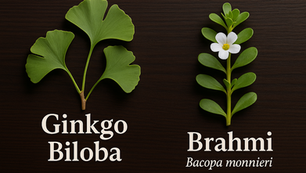top of page
Insights from Nature


How Citrus Bergamot and Ashwagandha Support Heart & Stress
Modern health challenges often arise from 2 interconnected issues: metabolic imbalance & chronic stress. Nature offers powerful solutions in the form of time-tested botanicals — among them, Citrus & Ashwagandha. These 2 ingredients represent a bridge between Mediterranean & Ayurvedic traditions. Citrus Bergamot supplements support lipid & cholesterol balance, while Ashwagandha helps regulate the body’s stress response. Combined, they promote overall resilience, energy & cardi


Citrus Bergamot Blend with Ayurvedic Herbs for Metabolic Health
Among the most promising natural combinations is the Citrus Bergamot blend — a synergy between Mediterranean citrus polyphenols and five Ayurvedic herbs: Ashwagandha, Ginger, Holy Basil, Turmeric, and Black Pepper. Together, these botanicals create a well-rounded approach that supports cholesterol balance, liver function, stress regulation, and cellular resilience.


Ginkgo and Brahmi: Natural Brain Boosters for Memory, Focus, and Clarity
Ginkgo Biloba and Brahmi (Bacopa monnieri), ancient brain aids, hail from China and India. Ginkgo Brahmi's memory power is trending as Americans sharpen their minds. Key Health Benefits of Ginkgo & Brahmi: Enhances Memory Ginkgo Brahmi memory boosts recall and learning naturally, Supports Brain Health Ginkgo Brahmi brain health protects neurons, Improves Focus Brahmi focus and Ginkgo keep you dialed, Lifts Cognition Ginkgo Brahmi cognitive synergy powers mental clarity and He


Elderberry and Echinacea: The Proven Herbal Duo for Stronger Immune Support
Immune health is a growing priority for many people, especially during seasonal changes and travel. Two popular botanicals often used for this purpose are elderberry and echinacea. You may see them in products such as elderberry syrup, elderberry juice, capsules, supplements, and elderberry and echinacea tea. But what makes them effective, and what does science actually say?


Turmeric and Holy Basil: Adaptogenic Detox Formula
Turmeric is celebrated for its cleansing & anti-inflammatory curcumin, while holy basil is prized as an adaptogen — an herb that helps the body cope with stress & maintain inner balance.
When used together, they form an adaptogenic detox formula: turmeric supports liver cleansing & inflammation control, while holy basil reduces stress hormones & strengthens immune defenses. This synergy supports both physical purification & emotional calm — the perfect balance between detox


Turmeric and Ashwagandha: Stress Relief and Balance
Turmeric (Curcuma longa) and ashwagandha (Withania somnifera) have been used for centuries in Ayurveda to promote physical strength, mental clarity, and emotional well-being. While turmeric is best known for its anti-inflammatory curcumin, ashwagandha is an adaptogen, meaning it helps the body adapt to stress and maintain equilibrium. When combined, these two herbs create a powerful natural formula that supports mood, reduces fatigue, and enhances both mental and physical res


Turmeric and Black Pepper: Why They Work Better Together
Turmeric is one of the world’s most researched herbs — celebrated for its vivid color & anti-inflammatory compound, curcumin. Yet there’s one challenge: on its own, curcumin isn’t absorbed efficiently by the body. Most of it passes through the digestive tract without reaching the bloodstream. That’s where black pepper (Piper nigrum) comes in. Its key compound, piperine, can increase the body’s ability to absorb curcumin by up to 2,000%.


Turmeric and Garlic: Detox and Immunity Blend
Turmeric curcumin and garlic extract strengthen the body’s natural cleansing systems, support liver health, and help defend against everyday oxidative and microbial stress. This article explores how their combined power works, the research behind it, and simple ways to use them safely in turmeric tea, cooking, or turmeric supplements.


Turmeric and Beetroot: Circulation and Energy Support
Turmeric and beetroot have unique compounds that help the body produce and use oxygen more efficiently. Together, they create a scientifically proven synergy that supports heart health, stamina, muscle recovery, and overall energy balance. Whether you enjoy them as a turmeric tea, juice blend, or in turmeric capsules, this duo helps your body feel energized, focused, and strong from the inside out.


Turmeric and Ceylon Cinnamon: Metabolic Harmony
Modern research confirms that both turmeric and cinnamon play important roles in regulating blood sugar, reducing inflammation, and supporting cardiovascular health. When combined, they create what herbalists call metabolic harmony — a natural way to stabilize energy, protect cells, and promote long-term wellness.


Turmeric and Ginger: Double Anti-Inflammatory Power
When combined, turmeric curcumin and ginger’s gingerols and shogaols create a natural synergy that supports joint health, digestion, immunity, and even brain balance. Whether enjoyed in turmeric tea, taken as turmeric capsules, or sprinkled as turmeric powder and ginger in meals, this duo delivers real anti-inflammatory power — without the side effects often seen with conventional pain relievers.


Turmeric and Cayenne Pepper: Heat and Detox Synergy
Modern research now confirms that combining these two ingredients — turmeric and cayenne pepper — doesn’t just enhance flavor — it creates a synergistic effect that promotes circulation, metabolism, and overall vitality. Let’s explore how turmeric curcumin and cayenne pepper’s capsaicin work together to activate the body’s detox pathways, and how you can safely enjoy their benefits through turmeric supplements, turmeric tea, or turmeric powder in your daily routine.


Turmeric and Ginger, Cayenne Pepper, Ceylon Cinnamon, Beetroot, Garlic, and Black Pepper: How Herbs Enhance Curcumin’s Power
Turmeric (Curcuma longa), known for its rich golden hue and potent active compound curcumin. This guide explores how six natural partners — ginger, cayenne pepper, Ceylon cinnamon, beetroot, garlic, and black pepper — amplify turmeric’s power, based on scientific findings and traditional wisdom. These combinations form the foundation of some of the most effective turmeric supplements, turmeric capsules, and even functional beverages like turmeric tea blends available today.


Berberine and Ceylon Cinnamon: Your Weight Loss Power Couple
Berberine from Barberry and Ceylon Cinnamon from Sri Lanka have ancient roots. Berberine weight loss and Cinnamon synergy are trending for slim-down goals.Key Health Benefits of Berberine + Ceylon Cinnamon: Aids Weight Loss Berberine weight loss revs metabolism, while Cinnamon stabilizes blood sugar, Burns Fat Berberine Cinnamon fat burner targets stubborn pounds, Balances Blood Sugar, Boosts Metabolism and Herbal Slimming.


Beetroot Combinations: With Turmeric, Ginger, or Magnesium
Beetroot is already a powerhouse of nutrition on its own, but when combined with other functional ingredients like turmeric, ginger, and magnesium, its health effects can become even more pronounced. Each of these natural compounds supports the body in different — yet complementary — ways: beetroot improves circulation, turmeric reduces inflammation, ginger aids digestion, and magnesium enhances energy and recovery.This article explores how these combinations work, what scien


Magnesium and Turmeric: A Natural Duo for Calm and Recovery
Inflammation, muscle tension, and chronic stress often go hand in hand — and they can silently drain your energy, focus, and overall health. While magnesium and turmeric are powerful on their own, combining them may offer broader benefits for recovery, mood, and long-term wellness. Magnesium supports muscle relaxation, nerve balance, and stress resilience, while turmeric (and its active compound, curcumin) helps control inflammation and oxidative stress.


Magnesium, Ashwagandha, and Turmeric: Can They Be Taken Together?
In the world of natural supplements, few combinations generate as much interest as magnesium, ashwagandha, and turmeric. Each offers unique benefits: magnesium supports calm and muscle recovery, ashwagandha helps the body adapt to stress, and turmeric reduces inflammation and supports joint health. But can you take all three together safely — and do they actually work better that way? Let’s explore what science and experience say about this powerful trio.


Dandelion and Holy Basil: Adaptogen and Detox Synergy
Some herbal pairings are designed to cleanse the body, while others focus on balance and resilience. The combination of dandelion and holy basil does both. Dandelion root offers gentle detox and liver support, while holy basil—also known as tulsi—is an adaptogen that helps the body manage stress. Together, they create a blend that supports immunity, detox, and stress balance.


Dandelion and Lemon Balm: Stress Relief and Digestive Comfort
When looking for herbal blends that soothe both the body and mind, few combinations are as calming as dandelion and lemon balm. Dandelion root is known for its role in gentle detox and digestive support, while lemon balm has been valued for centuries as a calming herb for stress and restlessness. Together, they form a balanced blend that promotes stress relief and digestive comfort. This article explores how these two herbs complement each other, the forms in which they are c


Dandelion and Ceylon Cinnamon: Blood Sugar Support Naturally
Herbal pairings are often designed to complement each other’s strengths. One such combination gaining attention is dandelion and Ceylon cinnamon. Dandelion root offers detox and liver support, while Ceylon cinnamon is prized for its antioxidant properties and role in blood sugar balance. Together, they create a natural blend for metabolic wellness.
This article explores the science behind the pairing, how each herb works, and safe ways to use them in daily routines.


Dandelion and Ginger: Digestion and Circulation Support
Among herbal pairings, few are as complementary as dandelion and ginger. Dandelion root is valued for gentle detox and liver support, while ginger is known worldwide for its digestive and circulatory benefits. Together, they form a blend that supports gut health, relieves bloating, and improves overall vitality. This article explores how the two herbs work individually, why combining them makes sense, and the best ways to use them for everyday wellness.


Dandelion and Turmeric: Detox and Anti-Inflammatory Duo
Two herbs often mentioned together for wellness are dandelion and turmeric. Each has a long history of traditional use and increasing scientific attention. When combined, they create a unique pairing that may support detoxification, reduce inflammation, and promote overall joint and liver health.
This article explores why dandelion turmeric detox blends are gaining interest, how the two herbs complement each other, and the safest ways to use them.


How Dandelion, Turmeric, Ginger, Ceylon Cinnamon, Lemon Balm, and Holy Basil Work Together for Wellness
IntroductionHerbs have long been used not just individually but also in blends, where one plant’s benefits complement another’s. Among these, dandelion root stands out as a versatile detoxifying herb. Traditionally valued for its support of the liver, kidneys, and digestion, dandelion root today is often combined with other botanicals to create well-rounded blends that target multiple aspects of wellness.This article explores the science behind dandelion root blends, focusing


Dandelion Root and Burdock Root: Detox and Skin Health Benefits
Introduction Herbal traditions often pair plants with complementary benefits. One powerful duo is dandelion root ( Taraxacum officinale ) and burdock root ( Arctium lappa ). Both have long been valued for their roles in detox, digestion, and skin health. Today, these herbs appear together in teas , powders , and dandelion supplements designed for cleansing and wellness. This article explores their similarities, differences, and safe use. Dandelion Root Benefits Digestive Sup
bottom of page